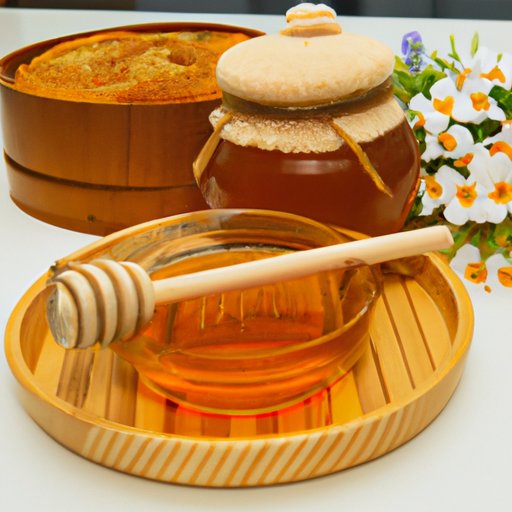Introduction
Honey is a sweet, viscous liquid produced by bees from the nectar of flowers. It has been used for centuries as a natural sweetener, healing remedy, and preservative due to its unique composition and antibacterial properties. Today, it’s gaining popularity again as an alternative to refined sugar and artificial sweeteners, and research is uncovering a wide array of potential health benefits associated with its consumption.

Comparison of Different Types of Honey
When it comes to selecting the best honey for health, there are several different varieties to choose from. Here is a look at some of the most popular types of honey and their respective benefits:
Raw, Unprocessed Honey
Raw, unprocessed honey is considered to be the purest form of honey. It has not been heated, pasteurized, or processed in any way, which means that it retains all of its beneficial enzymes, vitamins, minerals, and antioxidants. Raw honey is also known for its antibacterial and anti-inflammatory properties.
Manuka Honey
Manuka honey is a type of raw honey that is produced in New Zealand from the nectar of the Manuka tree. It has been found to have higher levels of antioxidants, anti-inflammatory compounds, and antibacterial properties than other types of honey. In fact, according to a study published in the European Journal of Clinical Microbiology & Infectious Diseases, Manuka honey was found to be effective against a range of bacteria, including Staphylococcus aureus and Escherichia coli.
Clover Honey
Clover honey is one of the most common types of honey available and is made from the nectar of clover flowers. It is known for its high levels of antioxidants and its ability to reduce inflammation. According to a study published in the Journal of Medicinal Food, clover honey was found to be effective in reducing symptoms of arthritis and improving joint mobility.
Buckwheat Honey
Buckwheat honey is produced from the nectar of buckwheat flowers and is known for its dark color and strong flavor. It is rich in antioxidants, minerals, and vitamins and has been found to have anti-inflammatory and antibacterial properties. A study published in the International Journal of Molecular Sciences found that buckwheat honey was effective in inhibiting the growth of certain bacteria, including Salmonella enterica and Staphylococcus aureus.
Medicinal Properties of Honeys
In addition to their antioxidant and anti-inflammatory properties, honeys also contain a variety of medicinal compounds that can provide additional health benefits. Some of these compounds include polyphenols, flavonoids, and phenolic acids, which have been found to have protective effects against heart disease, cancer, and other chronic illnesses.
Natural vs Artificial Sweeteners
Honey is often used as a substitute for refined sugar and artificial sweeteners. While both honey and artificial sweeteners are calorie-free, there are important nutritional differences between them. Refined sugar is high in calories and has been linked to weight gain, diabetes, and other health issues, while honey is a natural sweetener with fewer calories and a lower glycemic index. This means that honey does not cause blood sugar spikes like refined sugar and artificial sweeteners do.

Impact of Honey on Gut Health
The beneficial compounds in honey can also have a positive impact on gut health. Honey contains prebiotics, which are non-digestible fibers that help to promote the growth of healthy bacteria in the gut. Prebiotics have been found to improve digestive health, reduce inflammation, and boost immunity. Honey also contains probiotics, which are beneficial bacteria that can help to balance the gut microbiome.
Honey and Allergies
Honey has been found to have natural histamine-blocking and anti-inflammatory properties, which can help to reduce the severity of allergies. According to a study published in the Journal of Allergy and Clinical Immunology, consuming local honey on a regular basis can help to reduce the body’s sensitivity to allergens and reduce the severity of allergy symptoms.
Conclusion
Honey is a natural sweetener that has been used for centuries for its healing properties. It is rich in antioxidants, anti-inflammatory compounds, and beneficial bacteria that can promote overall health. Different types of honey offer different health benefits, so it’s important to choose the right one for your needs. Raw, unprocessed honey is generally considered to be the best choice, but Manuka, clover, and buckwheat honeys are also good options.
Overall, honey is a nutritious and delicious way to add sweetness to your diet without sacrificing your health. Whether you’re looking for a natural sweetener or a remedy for allergies and digestive issues, honey is an excellent choice.
Recommendations for Choosing the Best Honey for Health
When selecting honey for health purposes, it’s important to choose a product that is 100% pure and unprocessed. Look for raw, unfiltered honey that has not been heated or pasteurized. Additionally, look for honey that is labeled as “active” or “medicinal”, as these tend to have higher concentrations of beneficial compounds. Finally, try to select local honey whenever possible, as it contains trace amounts of pollen from local plants, which can help to reduce allergy symptoms.
(Note: Is this article not meeting your expectations? Do you have knowledge or insights to share? Unlock new opportunities and expand your reach by joining our authors team. Click Registration to join us and share your expertise with our readers.)
